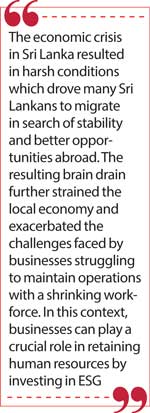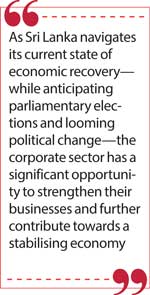Wednesday Feb 18, 2026
Wednesday Feb 18, 2026
Tuesday, 8 October 2024 00:25 - - {{hitsCtrl.values.hits}}

 As Sri Lanka navigates its current state of economic recovery—while anticipating parliamentary elections and looming political change — the corporate sector has a significant opportunity to strengthen their businesses and further contribute towards a stabilising economy.
As Sri Lanka navigates its current state of economic recovery—while anticipating parliamentary elections and looming political change — the corporate sector has a significant opportunity to strengthen their businesses and further contribute towards a stabilising economy.
There is increasing recognition that sustainability can lead to long-term economic benefits. For years, many companies have grappled with integrating sustainable practices into their operations, driven by increasing consumer and investor demand for responsible corporate behaviour. Sustainable practices not only enhance brand reputation and customer loyalty but also create operational efficiencies that reduce costs and mitigate risks. In an unpredictable economic landscape, companies that prioritise sustainability are generally better equipped to adapt to regulatory changes, resource scarcity, and market volatility.
More recently, the concept of Environmental, Social, and Governance (ESG) criteria has become a central pillar in the strategy of corporations worldwide. As the global business environment evolves, sustainable and socially responsible practices are not just ethical imperatives but also drivers of long-term profitability and corporate resilience.
ESG is shaping social impact for corporate bodies and integrating social responsibility into core business strategies and values. This is an essential component for not only the future of business, but also for stable economic growth.
Understanding ESG
ESG represents a set of standards that companies use to operate in ways that consider their environmental impact, social responsibilities, and governance practices. Environmental criteria gauge how a company safeguards the environment. Social criteria examine how it manages relationships with employees, suppliers, customers, and the communities where it operates. Governance deals with a company’s leadership, executive pay, audits, internal controls, and shareholder rights.
The evolution of Corporate Social Responsibility
Historically, Corporate Social Responsibility (CSR) initiatives were often seen as peripheral to the main business objectives, driven by philanthropic motives or regulatory compliance. The  evolution of CSR to ESG reflects a broader understanding of corporate purpose. This shift embodies a more integrated approach, embedding sustainability and ethical practices into the core of business operations.
evolution of CSR to ESG reflects a broader understanding of corporate purpose. This shift embodies a more integrated approach, embedding sustainability and ethical practices into the core of business operations.
Historically, CSR initiatives often operated in isolation from a company’s primary business activities. They were frequently driven by philanthropic goals, public relations efforts, or regulatory compliance, lacking integration with the company’s core strategic objectives. However, the rise of ESG marks a significant transformation in this approach. ESG criteria provide a structured and comprehensive framework that encompasses environmental stewardship, social responsibility, and governance practices, fundamentally integrating these aspects into a company’s operational and strategic framework.
ESG for resilient businesses
ESG considerations are fundamental drivers of long-term success and resilience for a business. It enables businesses to anticipate and mitigate risks, attract sustainable capital investment, and align with evolving regulatory expectations. Aligning ESG principles can significantly enhance a business’s resilience, sustainability, and profitability by aligning its operations with long-term societal and environmental goals.
Businesses must look inward, avoiding imprudent CSR initiatives and instead, invest in strengthening internal governance and sustainability. Firstly, focusing on environmental factors such as reducing carbon footprint, optimizing use of resources, and adopting renewable energy sources not only mitigates risks associated with regulatory changes but also enhances operational efficiency and reduces costs over time. Further, social considerations, such as fostering diversity and inclusion, ensuring fair labour practices, and supporting community development — can improve employee satisfaction, attract talent, and strengthen both staff and customer loyalty. Moreover, good governance practices, including transparent decision-making, risk management, and ethical leadership, can enhance trust among stakeholders and improve access to capital.
Workforce retention amid economic crisis
The 2022 economic crisis in Sri Lanka resulted in harsh conditions which drove many Sri Lankans to migrate in search of stability and better opportunities abroad. The resulting brain drain further strained the local economy and exacerbated the challenges faced by businesses struggling to maintain operations with a shrinking workforce. In this context, businesses can play a crucial role in retaining human resources by investing in ESG. By prioritising ESG initiatives, businesses not only contribute to the overall well-being of their workforce and community but also create a resilient and attractive workplace. These efforts can mitigate the impacts of the economic crisis by retaining talent,  enhancing employee engagement, and potentially attracting new talent to companies that demonstrate a genuine commitment to sustainability and social responsibility. In the face of economic instability, ESG investments offer a strategic approach to maintaining a stable and motivated workforce.
enhancing employee engagement, and potentially attracting new talent to companies that demonstrate a genuine commitment to sustainability and social responsibility. In the face of economic instability, ESG investments offer a strategic approach to maintaining a stable and motivated workforce.
ESG: An investment
While ESG investments may involve upfront costs, they can lead to significant long-term financial benefits by improving efficiency, enhancing reputation, reducing risks, attracting investment, and fostering innovation, all of which contribute to profitability. ESG-focused companies often have better risk management strategies. By addressing environmental risks, social issues, and governance concerns, they can avoid regulatory fines, legal fees, and reputational damage that could hurt profitability. Increased regulatory compliance through ESG investment allows companies to be better prepared. Further, companies with strong ESG profiles often enjoy lower capital costs and higher stock valuations.
ESG investments are aligned with creating long-term value for shareholders and stakeholders. By fostering a culture of transparency, accountability, and ethical leadership, companies can build trust and long-lasting relationships with stakeholders. This focus on sustainable growth and responsible governance supports sustained financial performance and shareholder returns over the long term.
In conclusion, embracing ESG principles represents more than just a corporate responsibility — it is a strategic investment with long-term benefits. In navigating Sri Lanka’s path to economic recovery amidst impending elections and political changes, businesses have a pivotal role to play in fostering stability and growth. Companies that prioritise sustainability, ethical governance, and social responsibility not only mitigate risks and enhance operational efficiencies— but also bolster their reputation, attract capital, and foster innovation. As global awareness and regulatory scrutiny on ESG issues continue to intensify, businesses that proactively integrate these considerations into their core strategies are well positioned to not only navigate uncertainties but also thrive in a sustainable and resilient manner. Ultimately, ESG is not merely a trend; but a pivotal pathway toward lasting success—ensuring companies remain adaptive, competitive, and impactful in a rapidly evolving and volatile economic and social landscape.
The writer is a policy specialist with over a decade of experience in international development and holds an MSc from the London School of Economics and Political Science, UK. Views are her own and not a reflection of her employer or associates. She can be
reached via
email at [email protected].
